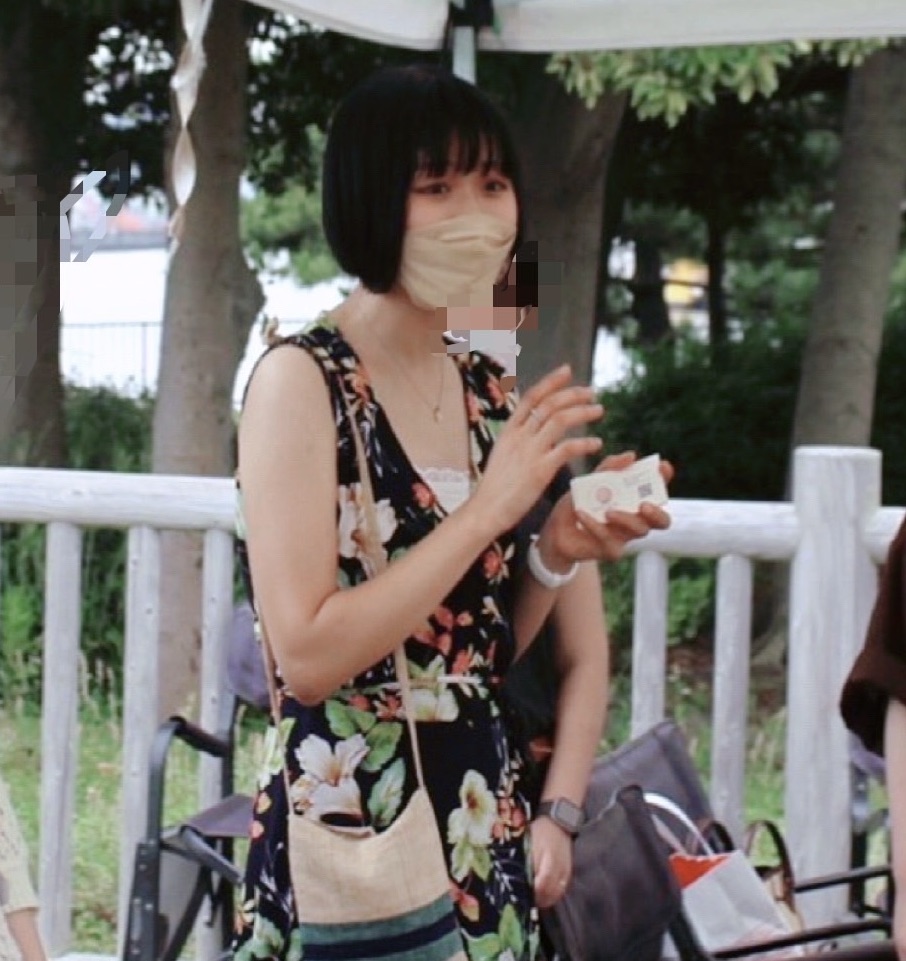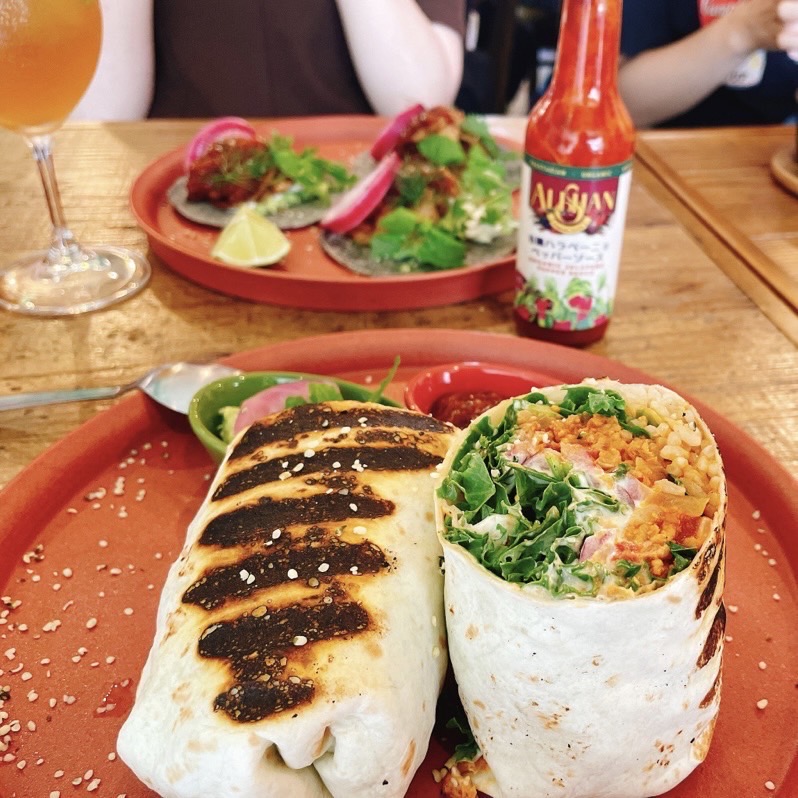New options for “food” with excitement: Interview with Emika Iinuma, the founder of Plant-BASE!

In our 26th interview, we interviewed Emika Iinuma of ID24, who is the founder and an active member of Plant-BASE. She told us what plant-based food is, and what she keeps in her mind in her activity. Read the article to find out more!
Q1: What does Plant-BASE do?
Plant-BASE works to promote plant-based foods in ICU. Plant-based is a movement that encourages the active inclusion of foods that use plant-based ingredients such as vegetables, fruit, pulses and grains instead of animal products such as meat, seafood and dairy products.
Plant-BASE is based on five elements that answer the question “Why plant-based?”. The four pillars are “Health”, “Animals”, “Environment” and “Inclusiveness”, and the core is “Excitement”.
__“Health”, “Animals” and “Environment” may be heard quite often, but what do you mean by “Inclusiveness” regarding plant-based food?
One of the main elements of plant-based food is that people with different cultures and values towards food can eat the same meal together. For example, if you have a religious belief that you don’t eat certain animals, you may have to prepare a special meal to avoid eating it. However, if you don’t consume animal products in the first place, then everyone can eat the same food around the same table, regardless of their values. Plant-based food is being reviewed from the perspective of “food diversity”, so I feel that it is worth promoting plant-based food at ICU, a place where people with diverse values gather.
Also, even if you feel that going vegan is a bit of a hurdle, with plant-based you can make your own choices at every meal, so anyone can incorporate plant-based into their life, anytime, however they want! You don’t have to be 100% plant-based! You can choose to eat plant-based only once a week, or only for breakfast.
“Inclusiveness” is one of the pillars of the programme, as it means that the possibility of adopting plant-based food is open to everyone.
__Is the difference between vegan and plant-based is whether you eliminate animal products or actively incorporate plant-based foods?
The first thing I want to say is that there is probably no absolute definition of either plant-based or vegan. There are many different types of vegan and it is often defined as a plant-based or plant-based style to encompass such people. However, some companies describe their products as plant-based even if they contain some animal ingredients, while others introduce it as plant-based food when the product is completely free of animal ingredients. Therefore, the current situation is that there is some variation in the definition of the terms. If there is one difference between vegan and plant-based, it is whether or not animal elimination is a priority in the overall lifestyle. I think the difference between vegans and plant-based people is that vegans exclude animal products from their overall lifestyle, not just only in food, but also in clothing. Veganism is a concept that focuses on the elimination of animal products in one’s overall lifestyle, whereas plant-based is a concept that focuses on the active inclusion of plant-based products, especially in food.
Q2: What are your specific activities?
At the moment, we introduce plant-based information on Instagram and develop new Gakki products. In the future we plan to sell sweets at ICU Festival, hold lectures, workshops, cooking sessions and collaborative events with other organizations.
There are currently around 10 members and it may come as a surprise but most of them eat animal products in their daily lives. They joined us because they are interested and want to learn about plant-based foods or to actually shift their eating habits to plant-based.
Q3: When did you start this activity?
We are still a small organization, having only been established in June this year. Therefore, most of our activities are still being planned behind the scenes, but we intend to move forward steadily and calmly, step by step.
Q4: How did you become interested in plant-based food and ethical consumption?
My family has always been involved in ‘food’ and ‘agriculture’, so I liked to eat foods with vegetables and beans. However, I used to eat a little bit of animal products too, but when I studied abroad in the Netherlands for a year during high school, I met friends and community members who introduced me to plant-based and veganism, which was a big trigger for me. As I listened to them, I found the idea very appealing, and I thought, “There are pros and cons, but let’s try it out myself first!”.
Also, plant-based food is becoming quite mainstream in Europe and the USA, so when I visited a restaurant that actually served plant-based food, I was surprised at how much better it tasted than I had expected, which made me think, “Plant-based food is so exciting!”
My mother sells confectionery online and more than half of the products are plant-based. There are good things about sweets that use butter and other ingredients, but there is always another route, plant-based. Based on this idea, we choose not to use eggs and butter, etc., as we normally use in confectionery. My current activities may have been influenced by such thoughts of my mother.
Q5: What made you decide to actually start your activities?
Recently, the plant-based market has been expanding in Japan, but I feel that people who eat plant-based are still perceived as “people with a slightly special way of thinking” and there is a tendency to draw a line between them and those who are not. It may be subjective, but that’s how I feel, both from my own experience as a “95%-vegan” for almost two years and from what is said in the general public.
___When and how have you felt boundaries between plant-based eaters and non-plant-based eaters?
For example, when I go out to eat and tell that I am vegan, to my friends at the university, to my circle mates, or my family when I go back home, there are many times when they look at me as if they were distancing themselves from me. Following this, people stopped inviting me to eat out, saying, “Oh, Emika is vegan.”
This is not to blame anyone. It can’t be helped, but it was difficult to maintain social relationships in trying to pursue a complete vegan. Then I asked myself to rethink if distancing myself from others was how I wanted to live. Because I hear similar concerns from other people practicing veganism or plant-based lifestyles, I feel that Japan is still not an environment where plant-based food is close at hand.
___What could be the cause for the boundaries to form?
In researching this my way, I think one factor is the lack of opportunities to experience plant-based foods and openly discuss the root, “Why to choose plant-based foods?”
So, I thought of this: “Then, why not make a flat, inclusive community first at ICU where vegans, flexitarians*, people who religiously don’t eat certain animals, or people who love meat but are just being curious, and for everyone to learn, discuss, make, and eat plant-based foods. By doing so, the charms of plant-based foods would expand.” This is how I established Plant-BASE.
*Flexitarians: Vegetarians who also consume animal-based foods from time to time.
Q6. What aspects of plant-based diets do you find intriguing?

It is the “discovery.”
At first, I thought removing animal-based foods was a “subtraction,” that meals would be simple, dull, and lacking in variety. However, as I continued with plant-based foods while gathering information, I realized that there is creativity because of the limited choices, such as examining how animal-like textures can be made with plant-based foods. I think that it coincides with the idea of “Less is More.”
It varies from person to person, but plant-based foods also have the one and only charm, filling but a light meal. For instance, a plant-based meat does not have animal fats, so it is less burdensome to the stomach. Even for people who like meat, I am sure that plant-based foods also have different attractions. This is something that I noticed after I started plant-based diets myself.
Q7. How did you feel when you started your activities at Plant-BASE?
Honestly, I was very anxious because there were no members at the beginning during the brain-storming level, and it was my first time creating something new as a leader. Even if things did not work as I wished, I accepted it, believing that “this is not a failure, but a discovery that this did not work out! Let’s move on.” With this mindset, I tenaciously gathered supporters, and I was able to create a basis for Plant-BASE. I realized that even if I am alone, once I “go for it,” there are unexpectedly many people with similar interests and beliefs. It was for our great members that I could come this far from nothing. I can’t thank them enough for that.
___What was most challenging in creating an organization of your own?
Working alone tends to overthink and get stuck. Nevertheless, thinking on and on about this and that keeps me in the closed world. I realized once again that talking and consulting with someone or discussing with our fellow mates was very important for me. I also wrote it here, but I was reminded that I need to remember the importance of our fellow mates, especially when the basis is not laid out.
___Did you really start from nothing, just by yourself?
Yes, I also think that it was reckless. I came up with activities like Plant-BASE this spring, but for the past two years, I could not have a fulfilling student life due to the COVID pandemic. I did have things in mind from the time I matriculated. Since I have been at the university, I have wanted to act and give back to society by working in areas where I have a genuine passion. I wanted to take some action even if I were to make a mistake. Now that I became a junior and student life was slowly coming back, I thought that it must happen right now. I was passionate about a couple of areas, and one of them was plant-based foods. I thought of putting into action the things I had learned, and activities to expand the circle of plant-based diets were the appealing choice that contributes to coping with environmental and social issues. Although I had not met many people at ICU who practice plant-based diets, it was the initiative with the hope that there must be people who would be interested.
Q8. When do you feel a sense of accomplishment?
Since we have not yet reached the stage of full-scale activities, I believe that we will be able to experience a great sense of accomplishment until now. However, I already felt a small sense of accomplishment. One of the members said, “I have recently started using tofu instead of meat, and it has expanded the variety of my cooking!” It was a great pleasure for me to see her put her learning into action in such a small way. I hope that this kind of circle will continue to expand beyond the organization through future activities.
Q9. Have you noticed anything new through your activities at Plant-BASE?
I realized the importance of the element of “excitement.” Excitement in this organization includes deliciousness, surprise, and fun. When the organization was first founded, it had only four pillars: “Health,” “Animals,” “Environment,” and “Inclusiveness.” However, as we thought about how to make the organization work well in the long term, I thought that an element of excitement for the members was essential in all of our activities, so I decided on “Excitement” as the core.
Personal experience also plays a role in this. Sometimes people say to me, “How can you stand to eat vegan food?” I have never felt that I am holding back. There is the light and delicious taste that only plant-based products can offer, the surprise of being able to recreate cheese with soy milk, and the pleasure of meeting new people and gaining information… Such excitement is an important element that drives me. And as I have a pet theory, I believe that excitement is the key to sustaining any action since humans are pleasure-seeking beings.
Speaking of sustainability, I hear the word “sustainability” everywhere these days. However, I believe that if we aim for sustainability of the natural environment, the first step is for ourselves and our organizations to be sustainable. I know there are pros and cons to this, but if we are going to tackle environmental issues, “doing it in an exciting way” is my theory. It is difficult to continue activities if you only feel obligated to do something or change the behavior of those around you.
___Is there anything you try to do to keep the “Excitement” alive?
I think there are times for everyone, in everything when you can lose your way even if you were doing something you loved. Regardless of this plant-based activity, when I feel so overwhelmed that I wonder why I did what I did, I always go back to the “why” point. This means questioning myself “Why do I want to do this?” When I am working hard, I tend to rely on my will that “WILL power,” but I call it “WHY power.” By going back to “WHY,” to my own starting point of “because I want to do this,” I can make the reason clear. There are always convincing reason such as “I like this,” or “I think this is valuable,” or “I want to connect with others through this, and the satisfaction that comes from that will lead to my happiness.” When I do this, I will definitely see the essential appeal of the activity I am doing now, and I will be able to think about how great it is. I think that asking the question “Why?” is the chance to remember what’s important to me.
Q10. What would you like to tell society?
In recent years, there has been a worldwide increase in the population of people who eat plant-based from a health and ethical standpoint, which can cause controversy with those who do not. However, I do not intend to deny eating animal products and promote 100% veganism. For example, there are ethical ways to produce animal products, such as pasture-raised beef, heirloom eggs, gibier, beekeeping, and so on. If we have a common vision of creating a sustainable future that takes into consideration people, animals, and the environment, I believe it is important to have an attitude to live together rather than being at odds with those initiatives that conflict with plant-based production. This is not a zero or one hundred thought, but rather a combination approach, where one initiative’s weaknesses are compensated for by the strengths of another.
This is because we do not believe that plant-based systems are the best or only solution, but only an option. The various problems we face are complex and intertwined. Therefore, there is no versatile approach, and it is essential to combine various measures. One of the leading candidates for such a combination is plant-based.
If 100 people eat half of their weekly diet plant-based, they will have the same results as 50 vegans. You don’t have to aim for perfection, so I would like to encourage as many people as possible to feel free to start with plant-based foods with tonight’s dinner.
___Please let us know if you have recommendations on how to start plant-based food.

There is a lot of content out there now, and I think that’s why it can be difficult to find information. However, when starting a plant-based food, it is important to choose information that is comprehensive, easy to understand, data-based, and reliable, and to want to sustain the activity. I think it is also good to instinctively choose something that excites you, or that you think looks good. However, my recommendation is the “Pick Up Limes” content. It is highly reliable because it is sent out by a certified nutritionist, and it also covers tips and cautions for those who are starting a plant-based food. Above all, the content is full of plant-based “joy. There is also a plant-based video for beginners in this channel. I would like to encourage you to check it out, as it provides comprehensive explanations of how to avoid mistakes that you might fall into if you do it by yourself, without finding any information. We can’t continue if the food doesn’t taste good, so I think it’s important to have a gut feeling that “this looks good!”
Q11. If there is anything you would like to do or try in the future, please let us know!
Veganism is rapidly expanding in Europe and the United States, so when looking for plant-based recipes, one may find that there are few Japanese dishes or that many ingredients are not familiar and are often imported. Therefore, we hope to create innovations that can be easily adopted in Japan, such as arranging overseas recipes into Japanese versions, or selling Japanese menus consisting of local vegetables and domestic ingredients at gakki on a limited basis.
Also, since the people who are interested in our organization tend to be those who are interested in food, the environment, and animals, we would like to collaborate with organizations in completely different genres, such as sports and music. For example, offer the experience that the delicious food we were enjoying at the collaborative project was actually plant-based! We will first gradually nurture small buds at ICU toward a future in which the plant-based option is recognized as a flat option and is taken for granted.
Instagram account
Plant-BASE:@icu_plant_based
Emika Iinuma:@emika_1001